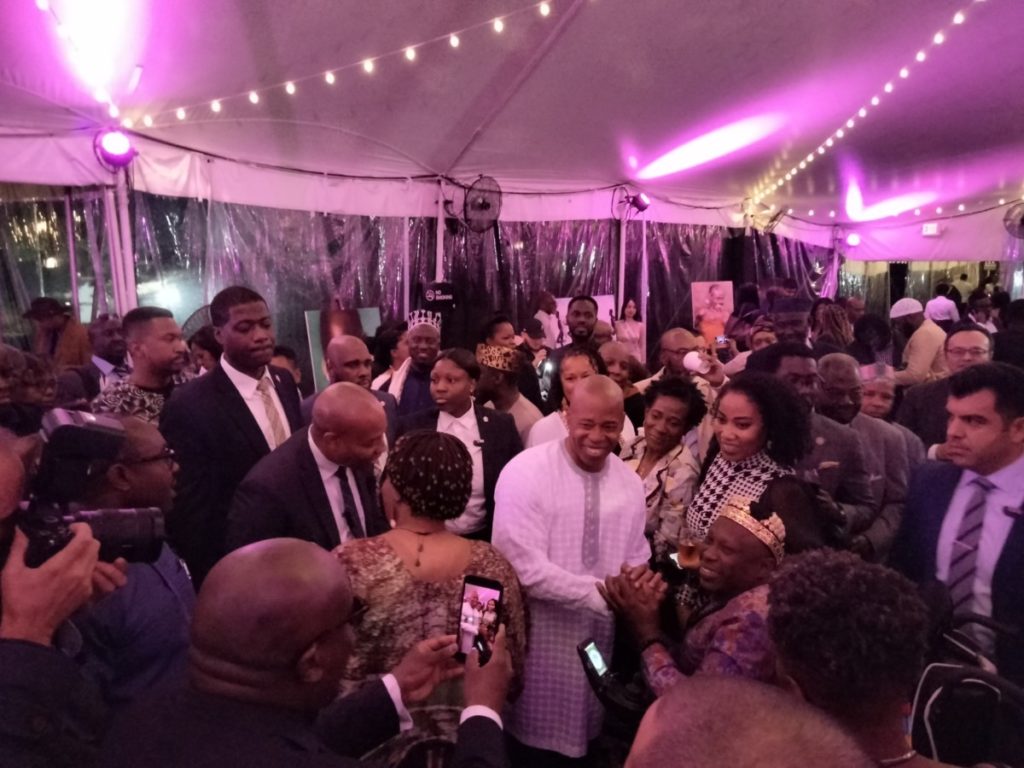
Mayor Eric Adams hosted an “African Heritage Reception” at Gracie Mansion last Thursday. He builds on a tradition started by former Mayor Bill de Blasio in 2018. Back then, de Blasio had planned to make the event a yearly celebration, but it had not been held since 2019.
The event was organized through MOSPCE, the Mayor’s Office of Special Projects and Community Events, and sponsored by EmblemHealth, a nonprofit health insurance company that serves as the insurer for all city employees, current and retired. The reception was the seventh heritage celebration event that Mayor Adams has held since his inauguration. These have included celebrations of Lunar New Year, St. Patrick’s Day, and Juneteenth.
Guests were served dishes inspired by African cuisine including jollof rice and plantains, hot mint tea and iced hibiscus. The tables were set up in front of gardens: crudites in front of raised beds of kale and tomatoes, herbs, and raspberries; entrees in front of an apple tree, boughs weighed down with fruit; and a third table in front of a fig tree.
The event was well attended by NYPD top brass in full dress uniform, patent leather shoes reflecting the blades of wet grass. Also in attendance were several politicians and staffers, including council member Kevin C. Riley and state senator Luis Sepúlveda, both representatives of The Bronx.
Adams arrived in the final half-hour of the event but was welcomed by people anxious to shake his hand or take selfies. Security officers were swamped by the exuberant crowd.
These optics were quite different from the last time an African heritage celebration had been held, when de Blasio, a White man of European descent, was introduced by Chirlane McCray, his African American wife. Once on stage, he asked his interracial son Dante to accompany him, an uncomfortable moment for a mayor often criticized for utilizing his family in discussions of race and identity.
Adams, New York City’s second African American mayor, took a different approach.
“I’m proud to be an American, but don’t get it mixed up–I’m African,” he stated from the tent stage. “You should walk around the globe…and tell people, ‘y’all better recognize, the mayor’s African.’”
He began his speech by asking for a moment of silence to honor the victims of the Bronx fire last January as well as victims of the Middle Passage, the term used to encapsulate the horrors of forced migration to the new world during the Atlantic slave trade. He continued to commemorate the collective history of African Americans and spoke of his December trip to several countries on the African continent, which he took while he was mayor-elect.
Adams noted that America’s modern success is intertwined with labor stolen from African people.
“It is time to reconnect. We have been torn apart for too long. All of our riches and natural resources have been taken from us. We have produced cocoa for other countries that make the chocolate…it is now time for Africa to be for Africans and for Africans must be in charge of their land.”
His comments followed those of Ama Dwimoh, Special Counsel to the Mayor. During her speech, Dwimoh had quoted Kwame Nkrumah.
“Divided we are weak,” she said. “United, Africa could become one of the greatest forces for good in the world.”
Nkrumah helped found the Organization of African Unity, an organization that sought cooperation between member states and the eradication of colonialism. It was replaced by the African Union in 2002.
A few weeks prior to Thursday’s event, Mayor Adams raised the African Union flag at Bowling Green park, the city’s oldest park.
“I’m not going to leave my ancestry behind like no other ethnic group in this city or country should…no matter where you are, this country states you do not have to abandon your homeland to embrace your new land, and I’m not going to abandon Africa,” Adams said before the flag was raised.
At the end of Thursday’s celebration, he was given a sash in the Pan-African colors of green, black, and red by representatives of the African Union Day Foundation in New York City.
“This is the day that our ancestors waited for,” the mayor said, “It’s time for us to live up for us to live up to that.”
